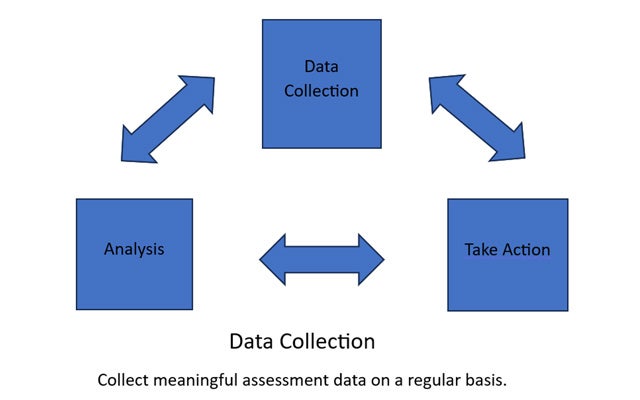Assessment
Assessment at Muskegon Community College is a continuous cycle of improvement based on the review of data. The next step is to make changes based on the data. The whole process is geared to promote analysis, collaboration, and reflection with the goal of increasing levels of student learning and success.

Data Collection
Collect meaningful assessment data on a regular basis.
Analysis
Examine the assessment data with other faculty and talk about key findings.
Take Action
Describe how the assessment data will be used to improve student learning.
Institutional Learning Outcomes
The Institutional learning Outcomes (ILO’s) provide a foundation for learning at Muskegon Community College. By participating in a degree program, students will gain skills in four areas.
Communication
Knowledge and application of written and verbal communication competencies using college level information literacy skills
Problem Solving and Technology
Knowledge and problem-solving skills using logical, mathematical, and scientific reasoning as well as technological resources
Ethical Reasoning and Creativity
Knowledge and application of creativity in the arts as well as knowledge of, and the ability to critically examine ethical values, principles, and issues.
Personal, Social, and Cultural Awareness
Knowledge and life skills required of an effective member of a diverse and global community
These institutional learning outcomes are included in numerous courses, and they are assessed on a regular cycle each year. The information gained is used to improve the educational experience and increase levels of student success for all students.
Program and Discipline Outcomes Assessment
Faculty members have developed outcomes at the discipline and program levels. These outcomes are assessed each year, a report is submitted, and feedback is provided by the Assessment Committee. A special area of emphasis for the reports is that the focus be on the data and specific recommendations to improve student learning. These assessment reports are shared and discussed at department meetings. This helps to foster a climate of using data to make informed decisions to increase student learning and success. For each program and discipline, curriculum maps have been developed to track where each outcome is introduced, reinforced, mastered, and assessed. Curriculum maps, program outcomes, and assessment reports are stored on both the Common S Drive and in a Blackboard shell called “Info Assessment Committee” that all faculty members have access to.
Course Level Assessment
At the course level, assessment is performed using the course objectives / outcomes. Assessment data is kept by the instructor and used to track student progress and provide feedback to the student.
Program Review
Each program and each discipline is on a five-year schedule for review. The purpose is to foster a cycle of continuous quality improvement. For the discipline reviews, data from assessment reports is used as part of the process to evaluate student success and to identify budget needs. For the program reviews, data on success rates, awards, and enrollment are used to evaluate the success of the program and to identify budget needs.
Co-Curricular Assessment
Assessment at the co-curricular level is focused in the following areas:
- Athletics
- Disability Support
- Experiential Learning
- Library
- Online Readiness Training
- New Student Orientation
- River Voices
- Tutoring
- Writing Center
For co-curricular assessment, data is collected in each area and a report is submitted each year. The report includes specific recommendations the faculty or staff members will use to improve the levels of student learning. A member of the Assessment Committee reviews the report and provides feedback. The information from the reports is shared at a department meeting to promote discussion, feedback, and quality improvement.
Role of the Assessment Committee
The Assessment Committee is made up of faculty and staff members who provide leadership and support for college-wide assessment efforts. The committee holds regular meetings to discuss new opportunities, to review assessment reports, and to collaborate with faculty, staff, and other campus committees to promote student success. The Mission of the Assessment Committee is “To promote and coordinate meaningful assessment practices at Muskegon Community College that will improve student learning.” The Assessment Committee is a standing committee of the Instructional Affairs Council. The Dean of Instruction and Assessment provides regular updates to the Instructional Affairs Council focused on practices related to the assessment of student learning.
Use of Assessment Data to Provide Evidence of Student Learning
ENG 101 General Education Assessment Report: data was used to justify giving a faculty member extra compensation to collaborate with area high school English teachers to share data and emphasize MLA citations and other problem areas for new students.
Writing Center Co-Curricular Assessment Report: first time students were given a post-visit survey. Results showed more available hours were needed for the Writing Center to better meet student needs. The hours were increased, and the student visits increased from 269 in Fall 2021 to 321 in Fall 2022.
Welding Program Outcomes Assessment Report: data showed the need for students to earn certification through the American Welding Society. Funds were provided to make the welding lab an American Welding Society Accredited Testing Facility. Welding certifications earned by students increased.
Online Readiness Training Co-Curricular Assessment Report: data from 2017 showed students in online courses had lower success rates compared to face-to-face courses. An online readiness training course was created for all new students. Data later showed that students who completed the online readiness training course had lower fail and withdrawal rates and higher pass rates than students who do not complete the online readiness training course.


